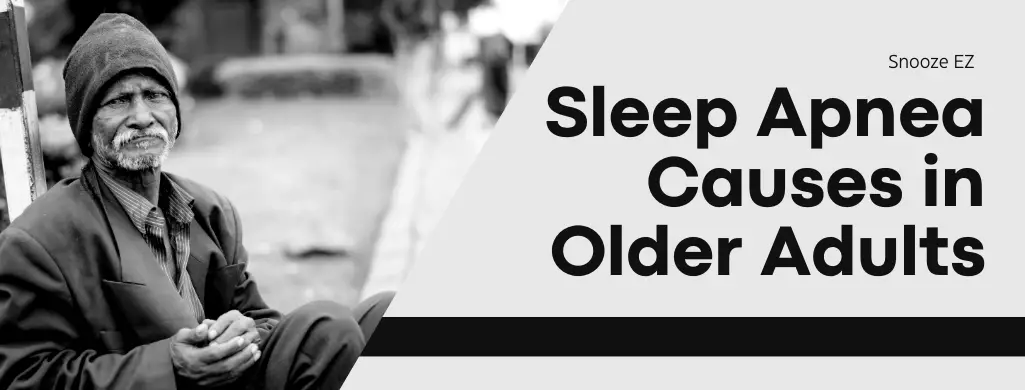If you or someone you know is an older adult experiencing sleep apnea, it is crucial to identify the root causes to effectively manage and improve the condition. By understanding the factors that contribute to sleep apnea in older individuals, you can take proactive steps to promote better sleep and overall well-being.
In this article, we will explore the common causes of sleep apnea in older adults and discuss potential strategies for prevention and treatment.
What causes sleep apnea in older adults?
Depending on the individual, sleep apnea in older adults can be caused for different reasons. These reasons are:
Neck Circumference
Some people gain more weight the older they get due to simply not moving around like they did in the past. This can lead to a larger neck circumference. This can also restrict airflow and make it more difficult to breathe while sleeping. Research suggests that a neck size of 17 inches or greater in men and 16 inches or greater in women can increase the risk of developing sleep apnea.
Muscle Tone
As people age, their muscle tone tends to diminish, resulting in less support for the throat and airway. This can cause them to collapse and narrow during sleep, leading to apnea events.
Alcohol and Medications
Alcohol and certain medications can relax the throat muscles, which can worsen sleep apnea symptoms. Elderly people are more likely to take medications that contain sedatives or muscle relaxants, making them more prone to these effects.
Medical Conditions
Obstructive sleep apnea (OSA) is a chronic medical condition that can be more common in older adults due to certain health-related factors. For example, high blood pressure, diabetes, lung disease, thyroid issues, and heart disease all increase the risk of OSA. Additionally, men are more likely to experience OSA than women. As we age, our bodies tend to produce less of the hormones needed for regulating our sleep, making it more difficult to maintain a healthy sleep pattern.
Weight
As mentioned, for older adults, sleep apnea can be triggered by carrying excess weight. This is largely due to the added stress placed on the airway when a person carries too much fat around their neck and chest. A study conducted in 2017 found that 60 percent of older adults with sleep apnea were overweight or obese. Carrying excess weight can cause the airway to narrow or block the airway, leading to apnea events.
How can sleep apnea in older adults be prevented or treated?
There are several strategies you can use to help prevent and treat sleep apnea in older adults. These include:
Weight management
Maintaining a healthy weight is essential for reducing the risk of developing obstructive sleep apnea. Weight loss can help relieve pressure on the airway and improve breathing during sleep.
Exercise
Regular exercise can help keep muscles toned and provide support for the throat and airway. This can reduce the risk of apnea events while sleeping.
Avoid alcohol, smoking, and medications
Alcohol, smoking, and certain medications can relax the throat muscles and make it more difficult to breathe while sleeping. Avoiding these substances is essential for older adults with sleep apnea.
Treat underlying medical conditions
If you or someone you know has an underlying medical condition that could be contributing to sleep apnea, it is important to seek professional treatment. This can help improve overall health and reduce the risk of developing apnea events while sleeping.
Use a CPAP machine
CPAP therapy is a common treatment for sleep apnea, and it can be particularly beneficial for older adults. This therapy works by providing a steady, gentle flow of air through a mask that is worn while sleeping. The flow of air helps keep the airway open and prevents apnea events from occurring. Additionally, CPAP machines are typically quiet, small, and lightweight, making them easy to use.
Lifestyle Changes
Making lifestyle changes can also help reduce the risk and severity of sleep apnea in older adults. These modifications may include avoiding large meals before bedtime, taking frequent naps during the daytime, and sleeping on your side or stomach rather than your back. Additionally, some people find that using a humidifier or sleeping with nasal strips can help reduce the effects of sleep apnea.
Conclusion
Sleep apnea is a common condition among older adults, and it can lead to serious health problems if left untreated. While there is no single cause of sleep apnea, some common factors in older adults include obesity, lack of muscle tone, certain medications, and underlying medical conditions.
To help treat and prevent sleep apnea in older adults, lifestyle modifications such as weight management and avoiding alcohol, smoking, and certain medications can be beneficial. Additionally, CPAP machines are a common treatment for sleep apnea that may help reduce the risk of apnea events while sleeping.
If you or someone you suspect may have sleep apnea, it is important to make an appointment with your family doctor.


